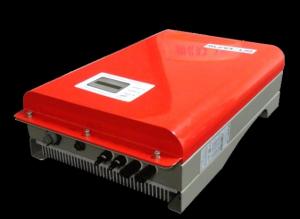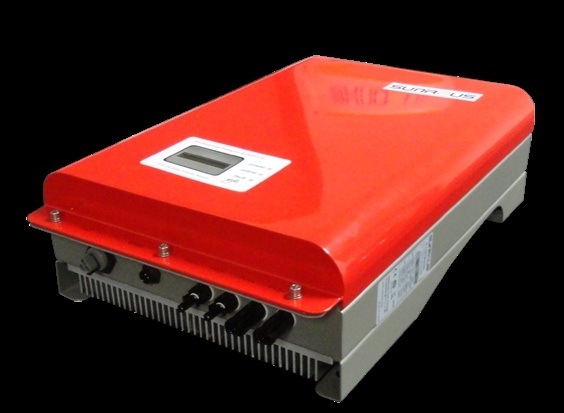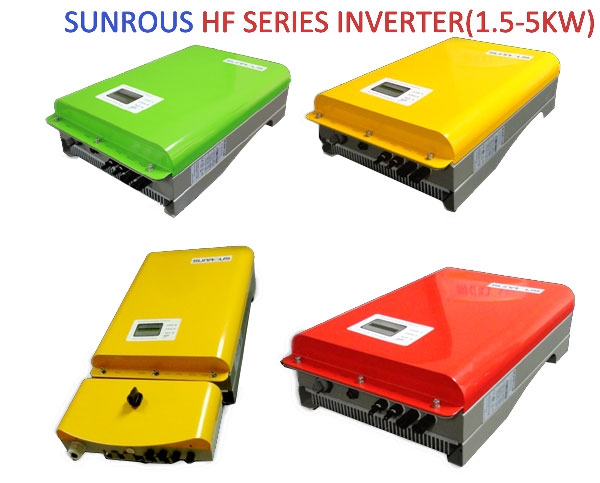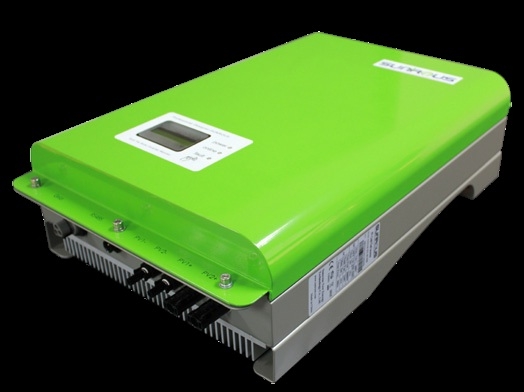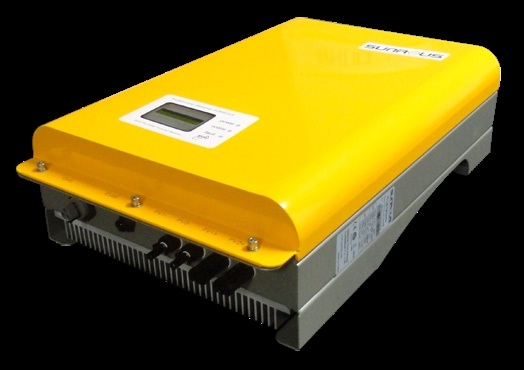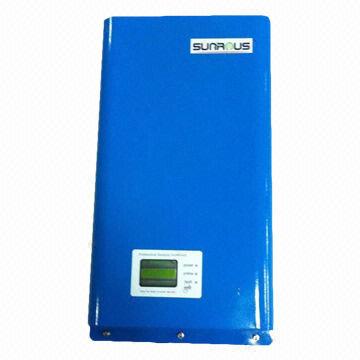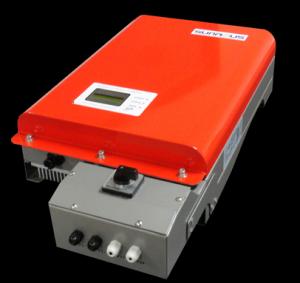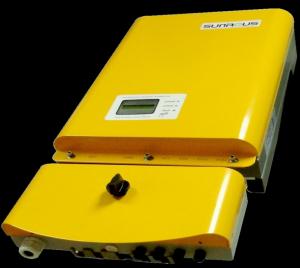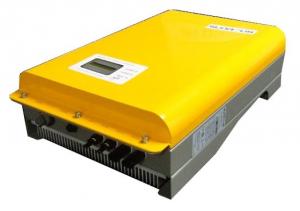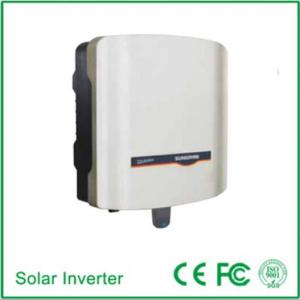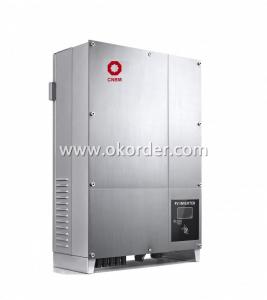Utl Solar Inverter High Frequency Transformer Isolation PV Grid-Tied Inverter
- Loading Port:
- Shanghai
- Payment Terms:
- TT or LC
- Min Order Qty:
- 1000 cm
- Supply Capability:
- 1000 cm/month
OKorder Service Pledge
OKorder Financial Service
You Might Also Like
1. Structure of High frequency transformer isolation PV Grid-Tied Inverter Description:
•The first manufacturer authorized by ETL institution in china;
• The first china HF PV grid-tied inverter tested by the PHOTON Lab with UL standard, reach the top level compared with SMA Sunny Boy HF series.
2. High frequency transformer isolation PV Grid-Tied Inverter Images
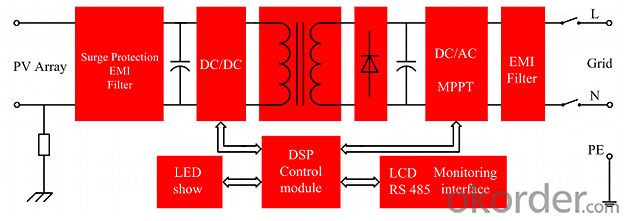
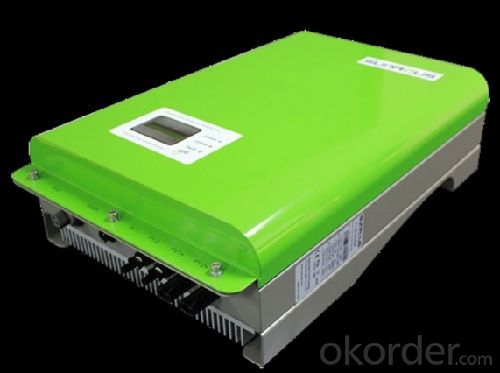
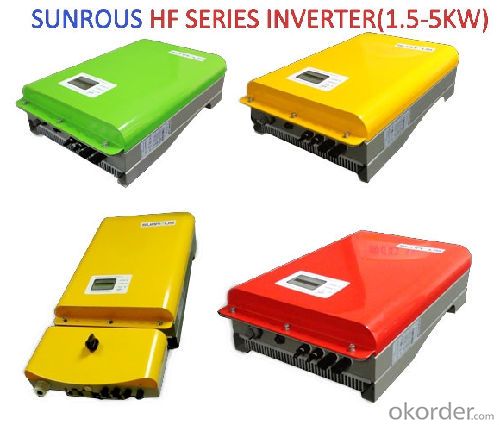
3. High frequency transformer isolation PV Grid-Tied Inverter Specification
| GT1.5-ZX-01/HF | GT2.0-ZX-01/HF | GT2.5-ZX-01/HF | GT3.0-ZX-01/HF | GT4.0-ZX-01/HF | GT5.0-ZX-01/HF |
Input(DC) | ||||||
Max.DC Power | 1600W | 2100W | 2650W | 3150W | 4200W | 5200W |
Max.DC Voltage | 600V | |||||
PV Voltage range, MPPT | 150V ~ 550V | 150V ~ 550V | ||||
Max.input current | 10.0A | 14.0A | 16.0A | 20.0A | 25.0A | 30.0A |
Number of MPP trackers | 1 | |||||
Max.number of strings (parallel) | 1 | 1 | 2 | 2 | 3 | 3 |
Output(AC) | ||||||
Nominal AC power / | 1500W | 2000W | 2500W | 3000W | 4000W | 5000W |
Max AC power | ||||||
Max.output current | 13.0A/7.0A | 17.0A/9.0A | 21.0A/12.0A | 25.0A/14.0A | 21.0A | 30.0A |
Nominal AC Voltage / range | 102-138Vac/180-264Vac | 180-270Vac | ||||
AC grid frequency / range | 47.5-51.5Hz / 59.3-60.5Hz | |||||
Power factor at rated power | 1 | |||||
THD | < 3% | |||||
AC connection | Single-phase | |||||
Efficiency | ||||||
Max. efficiency/Californian efficiency | > 98.0% / > 97.0% | |||||
MPP adaptation efficiency | > 99.0% | |||||
Protection devices | ||||||
DC reverse polarity protection | √ | |||||
AC short-circuit protection | √ | |||||
Ground fault monitoring | √ | |||||
Grid monitoring | √ | |||||
Output Transient Voltage Suppression | √ | |||||
Over load | √ | |||||
Anti-islanding | √ | |||||
General data | ||||||
Dimensions | 350 / 560 / 160 | 370 / 540 / 185 | ||||
(W/ H / D) in mm | ||||||
Weight(Kg) | 16 | 19 | 23 | |||
Operating temperature range | -25 ~ +60℃ | |||||
Storage temperature range | -40 ~ +70℃ | |||||
Ambient humidity | 0 ~ 100% | |||||
Consumption (night) | < 0.5W | |||||
Topology | HF-transformer galvanic isolation | |||||
Cooling concept | Convection | |||||
Enclosure type | IP65 / NEMA 3R | |||||
Features | ||||||
DC connection: PV special connector | √ | |||||
AC connection: connector | √ | |||||
LCD display & Backlit | √ | |||||
LED display | √ | |||||
Interfaces: RS485 | √ | |||||
Warranty: 10 years | √ | |||||
Certificates & approvals | G83 / G59 / TUV / SAA / ETL / JET/ CE | |||||
4. Features of High frequency transformer isolation PV Grid-Tied Inverter
·5 years warranty
· Sealing stainless steel shell, suitable for indoor or outdoor installation
· High frequency transformer isolation
· The highest effciency achieves 98%
· Wide input Voltage range
· Adopt connectors type cable connection, Easy operation and installation
· Best tracking effciency with OptiTrac MPP control
· operating temperature range -25 ℃ to + 55℃
· High reliability due to complete protection function
· Anti-theft protection
· Plug-in grounding
- Q: What is the role of anti-islanding protection in a solar inverter?
- The role of anti-islanding protection in a solar inverter is to ensure the safety of utility workers and prevent damage to the electrical grid during a power outage. It detects when the grid goes down and immediately disconnects the solar inverter from the grid, isolating it to prevent any power from flowing back into the grid. This prevents the phenomenon known as islanding, where the solar system continues to generate power and creates a potential danger for utility workers who may be working on the lines believing they are de-energized. By disconnecting from the grid, anti-islanding protection helps maintain the stability and integrity of the electrical system.
- Q: Is the grid side of the grid and the inverter?
- Off-grid system power transmission sequence: photovoltaic panels> relays> inverters> relays> electricity load;
- Q: Can a solar inverter be used in a solar-powered irrigation system?
- Yes, a solar inverter can be used in a solar-powered irrigation system. A solar inverter is responsible for converting the direct current (DC) generated by solar panels into alternating current (AC) that can be used to power various appliances and systems. In the case of a solar-powered irrigation system, the AC power produced by the solar inverter can be used to operate pumps, valves, and other components necessary for irrigation.
- Q: Photovoltaic grid-connected inverter problem
- But Baidu Encyclopedia clearly pointed out: the zero line is the secondary side of the transformer leads the neutral point of the line, and the phase line constitutes a circuit for power supply equipment.
- Q: What are the safety features of a solar inverter?
- The safety features of a solar inverter typically include protection against overvoltage, overcurrent, and short-circuit conditions. They also often have built-in ground fault protection and insulation monitoring to detect any faults in the system. Additionally, many solar inverters have anti-islanding features to prevent them from operating during a power outage, ensuring the safety of utility workers.
- Q: What is the role of a solar inverter in a microgrid system?
- The role of a solar inverter in a microgrid system is to convert the direct current (DC) electricity generated by solar panels into alternating current (AC) electricity that can be used to power the electrical loads in the microgrid. It also helps to manage the flow of electricity between the solar panels, battery storage, and the grid, ensuring efficient utilization and stability of the microgrid system.
- Q: What are the different types of solar inverters available?
- There are three main types of solar inverters available: string inverters, microinverters, and power optimizers. String inverters are the most common and cost-effective option, where multiple solar panels are connected in a series and the inverter converts the DC power from the panels into AC power for use in homes or businesses. Microinverters, on the other hand, are installed on each individual solar panel, providing more flexibility and maximizing the energy output of each panel independently. Power optimizers work similarly to microinverters by optimizing the performance of each panel, but they are paired with a central inverter instead of being individually installed. Each type has its own advantages and considerations, depending on the specific installation requirements and goals.
- Q: Can a solar inverter be used with a portable solar panel system?
- Yes, a solar inverter can be used with a portable solar panel system. A solar inverter is responsible for converting the direct current (DC) produced by the solar panels into usable alternating current (AC) electricity. Whether it is a portable or stationary solar panel system, a solar inverter is necessary to convert the DC power into AC power that can be used to power various devices and appliances.
- Q: How do you maintain a solar inverter?
- To maintain a solar inverter, regular inspections and cleaning are essential. It is crucial to check for any signs of damage or loose connections, and make sure the inverter is properly ventilated to prevent overheating. Additionally, keeping the surrounding area clean and free from any debris or obstructions can help optimize its performance. It is recommended to follow the manufacturer's guidelines and consult with a professional for any specific maintenance requirements.
- Q: Can a solar inverter be used with a solar-powered data center?
- Yes, a solar inverter can be used with a solar-powered data center. A solar inverter is responsible for converting the direct current (DC) generated by solar panels into alternating current (AC) that can be used to power electrical devices. In the case of a solar-powered data center, the solar inverter would play a crucial role in converting the DC electricity produced by the solar panels into AC electricity that can be used to power the data center's servers, cooling systems, and other equipment.
Send your message to us
Utl Solar Inverter High Frequency Transformer Isolation PV Grid-Tied Inverter
- Loading Port:
- Shanghai
- Payment Terms:
- TT or LC
- Min Order Qty:
- 1000 cm
- Supply Capability:
- 1000 cm/month
OKorder Service Pledge
OKorder Financial Service
Similar products
Hot products
Hot Searches
Related keywords
